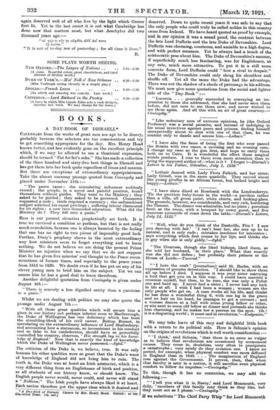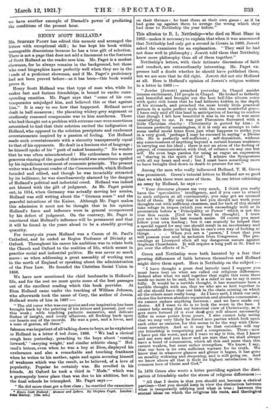BOOKS.
A DAY-BOOK OF DISRAELI.* CALENDARS from the works of great men are apt to be dreary, probably because the selectors are too conscientious and try to get something appropriate for the day. Mrs. Henry Head knows better, and has evidently gone on the excellent principle
which, if we may be allowed to use a theatrical expression, should be termed "Fat for fat's sake." She has made a collection
of the three hundred and sixty-five best things in Disraeli and has got them into her book quite regardless of times and seasons.
But there are exceptions of extraordinary appropriateness. Take the almost uncanny passage quoted from Coningsby and placed under November 11th :-
" The peace came : the stimulating influences suddenly ceased : the people, in a novel and painful position, found themselves without guides. They went to the Ministry ; they asked to be guided ; they asked to be governed. Commerce requested a code ; trade required a currency ; the unfranchised subject solicited his equal privilege ; suffering labour clamoured for its rights ; a new race demanded education. What did the Ministry do ? They fell into a panic."
Here is our present situation prophetically set forth. It is true we survived a condition so perilous, but that is not really much consolation, because one is always haunted by the feeling that one has no right to two pieces of impossibly good luck.
Further, Dizzy's prophecy shows in the most extraordinary way how ministers seem to forget everything and to learn
nothing. We do not believe we are doing the present Prime Minister an injustice when we say that we do not suppose
that he has given five minutes' real thought to the Peace recon- structions of former times, and especially to the peace years from 1815 to 1820. We doubt even if he has put on any of his clever young men to brief him on the subject. Yet we can assure him he has a good deal to learn therefrom.
Another delightful quotation from Coningsby is given under August 8th :— " There is scarcely a less dignified entity than a patrician in a panic."
Whilst we are dealing with politics we may also quote the passage under August 7th :—
" With all those great qualities which will secure him a place in our history not perhaps inferior even to Marlborough, the Duke of Wellington has one deficiency which has been the stumbling-block of his civil career. Bishop Burnet, in speculating on-the extraordinary influence of Lord Shaftesbury, and accounting how a statesman, so inconsistent in his conduct and so false to his confederates, should have so powerfully controlled his country, observes, His strength lay in. his know- ledge of England.' Now that is exactly the kind of knowledge which the Duke of Wellington never possessed.—Sybil."
The criticism of the Duke is, we believe, true. It was only because his other qualities were so great that the Duke's want of knowledge of England did not bring him to ruin. The truth is, the Duke was at heart an Irish aristocrat, which is a very different thing from an Englishman of birth and position, as all students of our history know, or should know. The English people never would, never could, and never will stand a " Noblesse." The Irish people have always liked it at heart. Esoh nation therefore got the upper class which it desired and
• A Day-Book of Disraeli: 'Meson by Md. Henry Head. Oxford at-the Ctionidon Press. Pa; net.]
deserved. Down to quite recent years it was safe to say that the only people who could truly be called nobles in this country
came from Ireland. We have heard quoted as proof by example, and in our opinion it was a sound proof, the contrast between the late Lord Dufferin and the late Duke of Devonshire. Lord Dufferin was charming, courteous, and amiable to a high degree,
and with perfect manners. Yet he always had a touch of the aristocratic pose about him. The Duke of Devonshire's manner, if superficially much less fascinating, was for Englishmen, at any rate, much more attractive. To put it in a still more concrete form, Lord Dufferin could " bow a rival to despair."
The Duke of Devonshire could only shrug his shoulders and shuffle off. Yet all the same the Duke had the advantage. There was not the shadow of a shade of patronage in his address.
We must now give some quotations from the social and lighter side of the " Day-Book " :—
" Lucretia . . . generally succeeded in conveying an im- pression to those she addressed, that she had never seen them before, did not care to see them now, and never wished to see them again. And- all this with an air of great courtesy.— Coningsby. '
" Like sedentary men of extreme opinions, he (the Oxford Professor) was a social parasite, and instead of indulging in his usual invectives against peers and princes, finding himself unexpectedly about to dine with one of that class, he was content only to dazzle and amuse him.—Lothair."
" I have also the fame of being the first who ever passed the Straits with two canes, a morning and an evening cane. I change my cane as the gun fires, and hope to carry them both on to Cairo. It is wonderful the effect these magical wands produce. I owe to them even more attention than to being the supposed author of—what is it ? I forget !—Disraeli's Letters to has Father, Gibraltar, July 1, 1830."
" Lothair danced with Lady Flora Falkirk, and her sister, Lady Grizell, was in the same quadrille. They moved about like young giraffes in an African forest, but looked bright and happy.—Lothair."
" I have since dined at Rosebank with the Londonderrys. 'Tis the prettiest baby-house in the world—a pavilion rather than a villa, all green paint, white chintz, and looking-glass. The grounds, however, are considerable, and very rich, bordering the Thames. The dinner was admirable, but no plate ; porcelain fresh as the room, with a bouquet by every guest, and five immense pyramids of roses down the table.—Dieraeli's Letters, July 24, 1835."
" Well, what do you think of the Dashville, Fitz ? I saw you dancing with her.' I can't bear her, she sets up to be natural, and is only rude ; mistakes insolence for innocence ; says everything which first comes to her lips, and thinks she is gay when she is only giddy?—Sybil."
" The Countess, though she liked bishops, liked them, as she told her husband, in their place.' What that exactly was she did not define ; but probably their palaces or the House of Lords.—Tancred."
" I hate the craft' [journalism] said St. Barbe, with an expression of genuine detestation. I should like to show them all up before I died. I suppose it was your sister marrying a lord that got you on in this way. I could have married a countess myself, but then, to be sure, she was only a Polish one and hard up. I never had a sister ; I never had any luck in life at all. I wish I had been a woman ; women are the only people who get on. - A man works all his life, and thinks he has done a wonderful thing if, with one leg in the grave and no hair on his head, he manages to get a coronet ; and a woman dances at a ball with some young fellow or other, or sits next to some old fellow at dinner and pretends she thinks him charming, and he makes her a peeress on the spot. Oh it is a disgusting world ; it must end in revolution.'—Endymion."
We may take leave of this racy and delightful little book with a return to its political side. Here is Sidonia's opinion on the origins of revolutions which is well worth consideration :-
" ` I think,' said Sidonia, ' that there is no error so vulgar as to believe that revolutions are occasioned by economical causes. They come in, doubtless, very often to precipitate a catastrophe ; very rarely do they occasion one. I know no period, for example, when physical comfort was more diffused in England than in 1640. . . . The imagination of England rose against the Government. It proves, then, that when that faculty is astir in a nation, it will sacrifice even physical comfort to follow its impulses.'—Coningsby."
To this, though it has no connexion, we may add the following :— " I tell you what it is, Harry,' said Lord Monmouth, very drily, ` members of this family may think as they like, but they must act as I please.'—Coningsby."
If we substitute " The Chief Party Whip " for Lord Monmouth we have another example of Disraeli's power of predicting the conditions of the present hour.



































 Previous page
Previous page